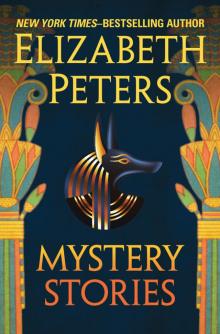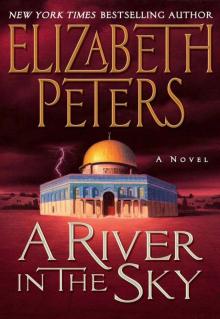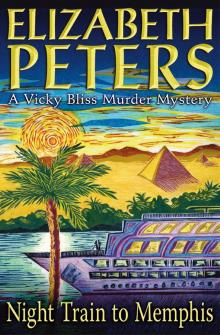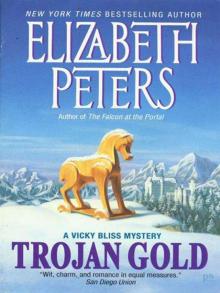- Home
- Elizabeth Peters
Crocodile On The Sandbank Page 8
Crocodile On The Sandbank Read online
Page 8
We sat on the deck the whole of that day; the experience was so new and so enchanting it was impossible to tear ourselves away. At dinner time delectable smells wafted up from the kitchen near the prow. Evelyn ate with a better appetite than I had seen her display for days; and when we retired to the saloon as the evening fell, she performed Chopin beautifully on the pianoforte. I sat by the window watching the exquisite sunset and listening to the tender strains; it is a moment that will always remain in my memory.
We had many such moments as the days went on; but I must curtail my enthusiasm, for I could write another of those repetitious travel books about the trip- the eerie singing of the crewmen as we lay moored at night; the exchanges of salutes with the Cook's steamers plying the river; the visits to the monuments of Dashoor (pyramids) and Abusir (more pyramids).
Most travelers hurry up the river as fast as possible, planning to stop at various historic sites on the return voyage. The voyage upstream is the difficult one, against the current, which, as the reader knows, flows from south to north; one is dependent upon the prevailing northerly wind, and, when this fails, as it often does, upon the brawny arms of the men. After we watched them tow the heavy boat through an area of sandbanks in a dead calm, we could not bear to inflict this labor on them any more often than was absolutely necessary. To see the poor fellows harnessed to a rope, like ancient slaves, was positively painful.
I had private reasons for wishing to push on as quickly as possible. The energetic Mr. Lucas would find difficulty in hiring a dahabeeyah as promptly as he hoped, but I did not underestimate his stubbornness, and I fancied a few weeks of peace and quiet before he caught us up.
However, my study of history had told me that the common method of travel is the wrong way. The monuments near Cairo are among the oldest; in order to see Egyptian history unroll before us in the proper sequence, we must stop on our way south instead of waiting till the return voyage. I wanted to see Twelfth Dynasty tombs and Eighteenth Dynasty temples before viewing the remains of the later Greek and Roman periods. I had therefore made out an itinerary before we left Cairo and presented it to Reis Hassan.
You would have thought I had suggested a revolution, the way that man carried on. I was informed, through Michael, that we must take advantage of the wind, and sail where, and as, it permitted.
I was beginning to understand a little Arabic by then, and I comprehended a few of the comments Michael did not translate. According to the reis I was a woman, and therefore no better than a fool. I knew nothing about boats, or wind, or sailing, or the Nile; who was I, to tell an experienced captain how to run his boat?
I was the person who had hired the boat. I pointed this out to Reis Hassan. I hope I need not say who won the argument. Like all men, of all colors and all nations, he was unable to accept an unpalatable fact, however; and I bad to argue with him every time I proposed to stop.
Except for running aground on sandbanks, which is a common-enough occurrence, we made admirable time. The wind was good. I therefore encountered some stiff resistance from the reis when I told him we would stop at Bern Hassan, which is some 167 miles south of Cairo. Brandishing my copy of M. Maspero's history, I explained to him that the tombs at Beni Hassan are of the time of Usertsen of the Twelfth Dynasty; chronologically they follow the pyramid of Gizeh, where we had been, and precede the antiquities of Luxor, where we proposed to go. I doubt that he understood my argument. However, we stopped at Beni Hassan.
The village was typical. I would have reported a man who kept his dog in such a kennel. Small mud hovels, roofed with cornstalks, looked as if they had been flung down at random on the ground. These huts are clustered around an inner courtyard, where the cooking is carried on; there is a fire, a stone for grinding corn, a few storage jars, and that is all. The women spin, or grind, or nurse their infants. The men sit. Children, chickens, and dogs tumble about in an indiscriminate mass, equally dirty, equally unclad; and yet the children are pretty little things when they are not disfigured by flies and disease.
When we appeared, the village seethed as if someone had stirred it with a stick. We were besieged by outstretched hands- some empty, begging for the inevitable backsheesh; some holding objects for sale- antiquities, stolen from the tombs, or manufactured by enterprising merchants to delude the unwary. It is said that some Europeans and Americans
Evelyn recoiled with a cry as an indescribably horrid object was thrust under her very nose. At first it appeared to be a bundle of dry brown sticks wrapped in filthy cloth; then my critical gaze recognized it for what it was-a mummy's hand, snapped off at the wrist, the dried bones protruding; black from the bitumen in which it had been soaked in ancient times. Two tawdry little rings adorned the bony fingers, and scraps of rotten wrappings were pushed back to display the delicacy in all its gruesome reality.
The seller was not at all put off by our mutual exclamations of disgust; it required Michael's added comments to convince him that we would not own such a repulsive object. Many travelers buy such mementos, even entire mummies, which are exported from the country like bundles of wood instead of human remains.
Evelyn's sensitive face was pensive as we went on. "How strange and pitiful," she said musingly. "To reflect that that horrid object was perhaps once clasped ardently by a husband or lover! It was very small, was it not, Amelia-a woman's hand?"
"Don't think about it," I said firmly.
"I wish I could stop thinking about it. My reflections should dwell on the frailty of the flesh, on human vanity, and the other precepts of Christian faith… Instead I shudder at the horror of what is, after all, only a bit of cast-off flesh- the discarded garment of the soul. Amelia, if it had touched me I should have died!"
We went up to the tombs. You may rest assured, dear reader, that I had not wasted my time during the voyage. I had with me the Reverend Samuel Birch's little books on the study of Egyptian hieroglyphs; and my hours of poring over these sources were repaid in full when I was able to point out to Evelyn the group of hieroglyphic signs which spells the name of the chief of this district during the Twelfth Dynasty. There is no thrill equal to seeing the actual signs, painted on crumbling rock walls instead of printed on a page; finding in them meaning and sense…
But I fear I am being carried away by my scholarly enthusiasm. The tombs had considerable interest even for casual tourists, the painted scenes on the wall are gay and pretty, showing the activities in which the dead man loved to indulge during his lifetime, as well as the industries pursued on his estates. His serfs blow glass and work gold into jewelry; they tend the flocks, fashion pottery, and work in the fields.
Some years later these same splendid tombs were savagely mutilated by native Egyptians extracting fragments of the paintings for sale to antiquities dealers. But even when we saw them I was aware of some of the abuses Emerson had talked about. Fragments of paint and plaster were constantly flaking off the walls, which were dulled by the smoke from the candles carried by the guides. Visiting travelers were no more careful than the uninformed Egyptians; as we stood in one tomb I watched an American gentleman calmly walk away with a fallen bit of stone that bore a pretty picture of a young calf. I shouted at him, but Evelyn prevented me when I would have pursued him to retrieve the fragment. As she pointed out, someone else would have taken it anyway.
The name of Emerson has now returned to the narrative; but the reader must not suppose that it was absent from our thoughts during the halcyon days of sailing. Evelyn did not refer to Walter, but when I introduced his name the eager light in her eye, the unguarded way in which she turned toward me told me that, though absent from her tongue, the name was not far from her thoughts.
As for myself, I thought often of Emerson, though not, of course, in the same way Evelyn regarded his young brother. No; the thought of Emerson was a stinging mosquito, which produced an itching spot that constantly demanded to be rubbed. (The Critic comments upon the inelegance of this comparison. I insist upon leaving it in.) Emerson's criticisms kept rec
urring to me; I saw evidence of neglect and vandalism to the monuments wherever we went, and I itched (you see the appropriateness of my analogy), I positively itched to be in charge of the entire antiquities department. I would have settled things properly!
We got to know some of our crew quite well. The cook was an elderly, toothless black gentleman from Assuan, who produced the most delicious meals upon two small charcoal burners. The waiters, Habib and Abdul, were handsome boys who might have stepped straight out of an ancient Egyptian painting, with their broad shoulders and long, slim bodies. We got to be very fond of them, especially Habib, who laughed in the most infectious manner whenever I spoke to him in Arabic. The crewmen I could only vaguely distinguish by their complexions, which ranged from black to cafe-au-lait; they looked identical otherwise, in their flowing striped robes and white turbans.
I acquired a new name during the voyage. The Egyptians have nicknames for everyone, and some of them are quite amusing and disrespectful. Maspero told us of a friend of his, an American gentleman named Wilbour, who is the proud possessor of a magnificent white beard. The Arabs call him "Father of the Beard." My name was equally descriptive; they called me the Sitt Hakim, the lady doctor. I felt I deserved the title; scarcely a day went by when I was not patching up some scrape or cut, although, to my regret, I was not called upon to amputate anything. When we stopped in the native villages I was always being approached by dark-eyed mothers, some no more than children themselves, carrying their pitiful babies. I had used virtually all my stock of eye medicines by the time we left Beni Hassan- and knew, unfortunately, that my efforts were like a single drop of water in a desert. The key to the regeneration of Egypt lies in the women. So long as they are forced into marriage and motherhood long before they are ready for such responsibilities- sold to the highest bidder like animals, untrained in even the rudiments of sanitation and housekeeping,, untaught, unassisted, and degraded- so long will the country fail to realize its potential. I determined that I would speak to Major Baring about this as soon as we returned to Cairo. I didn't suppose that the man had any notion of matters outside of his account books; men never do.
With such reflections and studies the days passed delightfully. Evelyn's companionship added immeasurably to my enjoyment. She was the perfect friend: sensitive to beauty, responsive to my moods and to the frequent distressing sights of poverty and disease; interested in learning all she could of the history that unrolled before us; cheerful; uncomplaining. I found myself dreading the spring. It would have been so pleasant to look forward to years of Evelyn's company; we could have lived like sisters, enjoying the domestic comforts of England, and traveling whenever we got bored with domesticity. But that was clearly not to be expected. Whether Evelyn yielded to her cousin's suit or not, she would certainly marry one day; and I rather believed that Lucas would prevail. He had every argument on his side. So I decided to enjoy the moment and forget about the future.
After Beni Hassan, the next site of interest to historians is near a village called Haggi Qandil. The region has a more famous name; it is sometimes called Tell-el-Amarna, and it was the city of the heretic king Khuenaten- if indeed he was a king, and not a queen in disguise, as some archaeologists have claimed. I had seen copies of the strange portraits of this monarch, and had to admit that his form bore more resemblance to the feminine than to the masculine.
Even more intriguing was the speculation on the religious beliefs of this peculiar personage. He had abandoned the worship of the old gods of Egypt and given his devotion to the sun, Aten. Did he worship only this god? Was he the first monotheist of whom history gives us a record? And what connection could there be between this supposed monotheism and the monotheism of the Hebrews? Moses was raised at the court of Egypt. Perhaps the elevated faith of Yahweh derived, ultimately, from the iconoclastic religion of an ancient Egyptian pharaoh!
Evelyn was rather shocked when I proposed this idea, and we had a pleasant little argument. I gave her a lecture on Khuenaten; she was always anxious to learn.
"He abandoned the royal city of Thebes," I explained, "and built a new capital dedicated to his god, on land that had never been contaminated by other worship. Herr Lepsius discovered some of the boundary inscriptions placed on the rocks around the city of Khuenaten. There are also tombs in the cliffs, rather interesting ones; the drawings are quite different in style from the usual tomb decorations. If the wind suits, I think a visit there might be profitable. What do you say?"
I was leafing through my copy of Brugsch's Geographical Dictionary (Heinrich Brugsch, the archaeologist, not his disreputable brother) as I spoke; but I watched Evelyn out of the comer of my eye, and saw the betraying color rise in her cheeks. She put down her pencil- she was quite a good little artist, and had made a number of nice sketches along the way- and gazed out across the river toward the cliffs.
"What is the name of the place, Amelia?"
I rifled busily through the pages of Brugsch.
"The ancient name of the place was-"
"The modern name is El Amarnah, is it not?"
"There are three villages on the spot, el-Till and el-Haggi Qandil and El-Amariah. A corruption of these names- "
"Yes, yes, I recall- I recall Walter speaking of it. That is where he and Mr. Emerson are working. You would have no reason to remember that, of course."
I decided that Evelyn was being sarcastic. She seldom allowed herself this luxury, so I overlooked it on this occasion.
"Is that so?" I said casually. "Well, I suppose there is no reason why we should necessarily encounter the Emersons. The site is large and the tombs are scattered. We will take it as settled, then. I will speak to Reis Hassan."
Owing to a difficulty with the wind, we did not reach the village of Haggi Qandil for two days. Indeed, we had some trouble reaching it at all; if I had not been determined, Reis Hassan would not have stopped. He mentioned unfavorable winds, disease in the village, the remoteness of the archaeological remains from the river, and a number of other irrelevant arguments. You would have thought the good captain would have learned by now the futility of arguing with me; but perhaps he enjoyed it. Honesty compels me to admit that Hassan may have had some reason on his side. We ran aground on a sandbank outside the village and had to be carried ashore by the villagers. We left Reis Hassan staring gloomily at his crew, who were trying to free the boat and making very little progress.
Michael, our dragoman, led the way into the village. It was a typical Egyptian village- perhaps a trifle more wretched than others. The narrow streets were heaped with refuse of all kinds, steaming under the hot sun. Dust and windblown sand coated every surface. Mangy dogs lay about the streets, their ribs showing. They bared their teeth at us as we passed, but were too miserable even to rise.
Half-naked children stared from eyes ringed with flies, and whined for backsheesh.
Michael plunged into the crowd, shouting orders, and eventually we were presented with a choice of donkeys. We chose the least-miserable-looking of the lot, and then I proceeded to a ritual which had caused considerable amusement along the way, and which puzzled even our loyal Michael. Following my orders, interpreted by Michael, the reluctant owners took the filthy cloths from the animals' back, swabbed them down with buckets of water, and smeared on the ointment I supplied. The donkeys were then covered with fresh saddle cloths, supplied by me, which were laundered after every use. I think it was the only time in the lives of these little donkeys that the cloths were ever removed; sores and insects proliferated under them.
The scowls on the faces of the donkeys' owners turned to broad smiles as I tipped them liberally for their unusual effort; I took the opportunity to add a short lecture on the economic advantage of tending one's livestock, but I was never sure how much of this discourse Michael translated. With the now laughing attendants running alongside, we trotted off across the desert toward the tombs.
The cliffs, which run closely along the river in other areas, fall back here, leaving a se
micircular plain some seven miles long by four miles wide at its greatest extent. The cultivated land is only a narrow strip less than half a mile wide; beyond, all is baking yellow-brown desert, until one reaches the rocky foothills of the cliffs into which the tombs were cut.
We were bouncing along in fine style, squinting against the glare of the sun, when I beheld a figure coming toward us. The air of Egypt is so clear one can make out details at distances impossible in England; I saw at once that the person approaching was not a native. He wore trousers instead of flapping skirts. My internal organs (if I may be permitted to refer to these objects) gave an odd lurch. But soon I realized that the man was not Emerson. Evelyn recognized him at the same time. We were side by side; I heard her soft exclamation and saw her hands clench on the reins.
Walter did not recognize us immediately. He saw only two European travelers, and ran toward us with increased speed. Not until he was almost upon us did he realize who we were; and he stopped so abruptly that a spurt of sand shot up from under his heels. We continued to trot decorously toward him as he stood swaying and staring like a man in a dream.
"Thank God you are here!" he exclaimed, before we could greet him. "That is… you are really here? You are not a vision, or a mirage?"
His eyes were fixed on Evelyn's face; but his agitation was so great I deduced some other cause of trouble than frustrated love.
"We are really here," I assured him. "What is wrong, Mr. Walter?"
"Emerson. My brother." The lad passed his hand across his damp forehead. "He is ill. Desperately, dangerously ill… You have no doctor with you, of course. But your dahabeeyah – you could take him to Cairo…?"
His brother's danger and Evelyn's unexpected appearance had turned the poor boy's brains to mush. I realized that I must take charge.
"Run back to the boat and get my medical kit, Michael," I said. "Hurry, please. Now, Mr. Walter, if you will lead the way…"
"A doctor…" mumbled Walter, still looking at Evelyn as if he didn't believe in her.

 Mystery Stories
Mystery Stories A River in the Sky
A River in the Sky He Shall Thunder in the Sky taps-12
He Shall Thunder in the Sky taps-12 Laughter of Dead Kings vbm-6
Laughter of Dead Kings vbm-6 Silhouette in Scarlet vbm-3
Silhouette in Scarlet vbm-3 Night Train to Memphis vbm-5
Night Train to Memphis vbm-5 Borrower of the Night vbm-1
Borrower of the Night vbm-1 The Golden One
The Golden One Trojan Gold vbm-4
Trojan Gold vbm-4 Crocodile On The Sandbank
Crocodile On The Sandbank